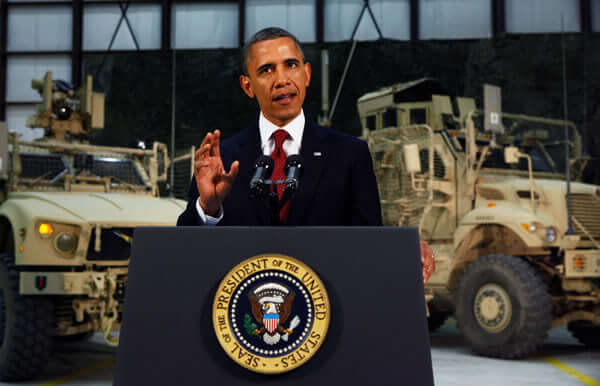We have reached an endpoint of sorts in the decade-long Afghanistan War. President Obama will not keep U.S. troops in Afghanistan to defeat the Taliban and force them to accept terms of any kind. Have we lost the war? Should we have left years ago, or never gone in? That depends on your view of what we were fighting for and about in the first place.
I. Lowering The Bar
Gone is the much greater expectation that NATO will leave behind a cohesive central government with real influence beyond Kabul and a handful of other population centers. Gone is the assumption that Helmand Province, Kandahar and the rest of the heavily contested south – where the bulk of the 2010 influx of troops was sent – will remain entirely in the control of the central government once that area is transferred to Afghanistan’s fledgling national security forces.
…President Obama’s national security adviser, Thomas E. Donilon, described a hoped-for outcome in Afghanistan that was far less ambitious than what American officials once envisioned.
“The goal is to have an Afghanistan again that has a degree of stability such that forces like Al Qaeda and associated groups cannot have safe haven unimpeded, which could threaten the region and threaten U.S. and other interests in the world,” Mr. Donilon said.
Nowhere on this list is the defeat of the Taliban, which – seeing this coming – gave up on peace talks months ago:
While Kandahar and other population centers in the south have seen a decrease in Taliban attacks since the surge forces arrived, insurgent attacks have increased in less populated southern areas, military officials report. The heads of the Senate and House intelligence committees, appearing on CNN’s “State of the Union” program two weeks ago, and reporting on a recent trip to Afghanistan, said the Taliban were gaining ground, something that is bound to accelerate once the NATO troops give way to Afghan-led forces.
“I think we’d both say that what we found is that the Taliban is stronger,” Senator Dianne Feinstein, Democrat of California, said, seated next to Representative Mike Rogers, Republican of Michigan.
As Dan Spencer noted yesterday, this is a distinct change of tune from 2008, when then-candidate Obama described Afghanistan as “a war that we have to win” and 2009, when President Obama declared:
This is not a war of choice. This is a war of necessity. Those who attacked America on 9/11 are plotting to do so again. If left unchecked, the Taliban insurgency will mean an even larger safe haven from which Al Qaida would plot to kill more Americans.
So this is not only a war worth fighting; this is a – this is fundamental to the defense of our people.
But despite the President’s bold words, the Administration never did set a clear definition of victory in Afghanistan. Specifically, while the State Department designated the Pakistani Taliban a terrorist group, it resisted requests by even Democratic Senators to designate the Afghan Taliban as a terrorist group, apparently – at the time – due to an unwillingness to foreclose a negotiated resolution that would bring the Taliban back into the political process. This was not a new problem (the State Department had likewise refused to designate the Taliban as a terrorist group during the Bush Administration even in 2001) but at a time when the nation was ramping up its military commitment to the war in Afghanistan, the broader refusal to define an enemy to be defeated (the essential element of any military action) left the war effort directionless and increasingly difficult to justify to a war-weary public. And now, by withdrawing unilaterally without using the leverage of our arms to force a negotiated resolution on favorable terms, we are essentially washing our hands of the fight against the Taliban.

